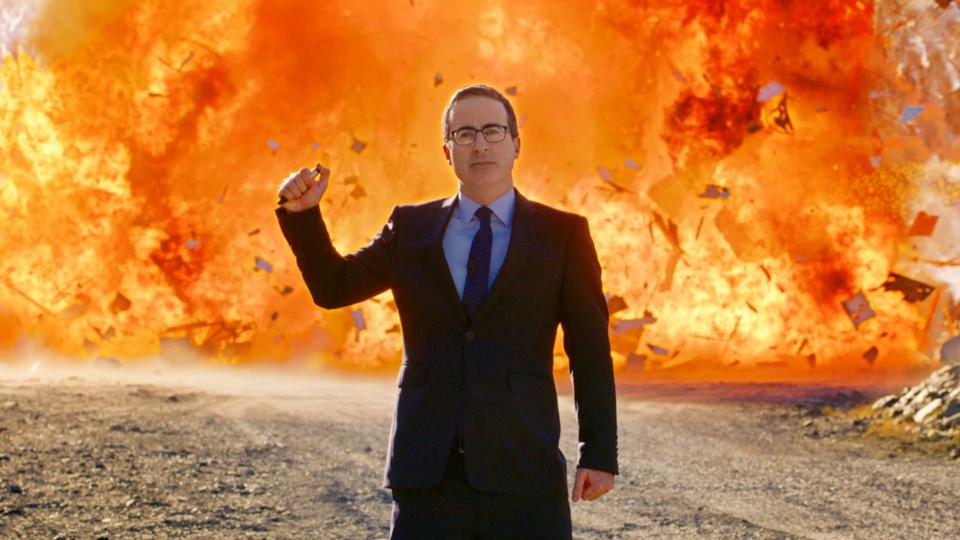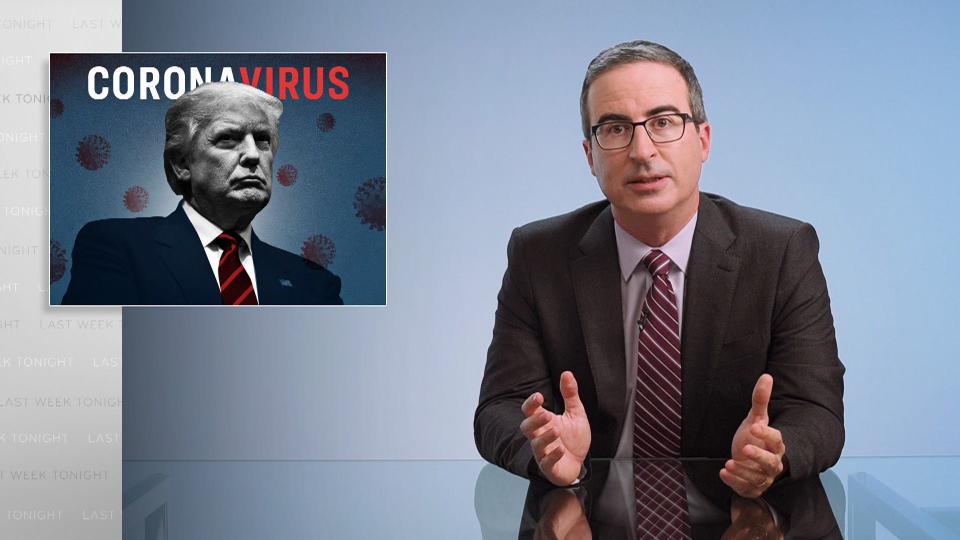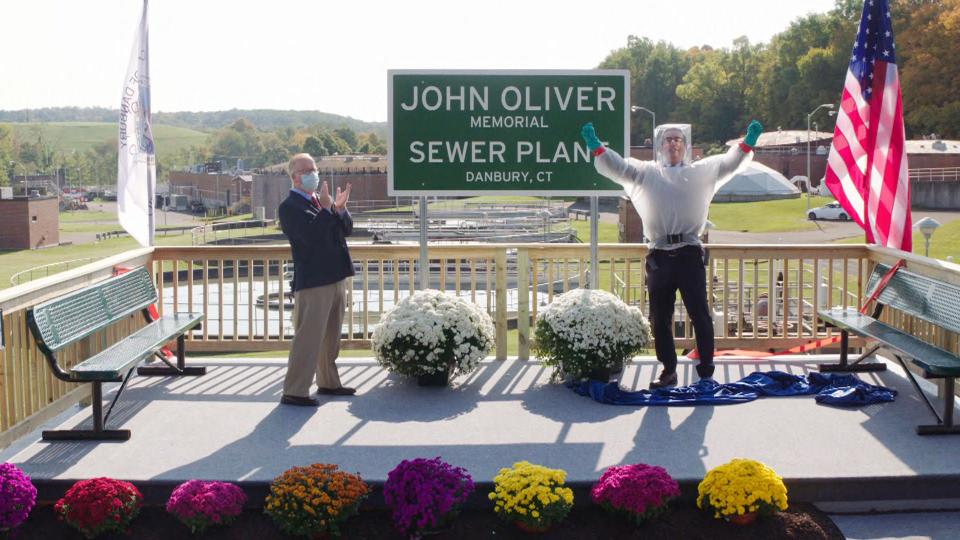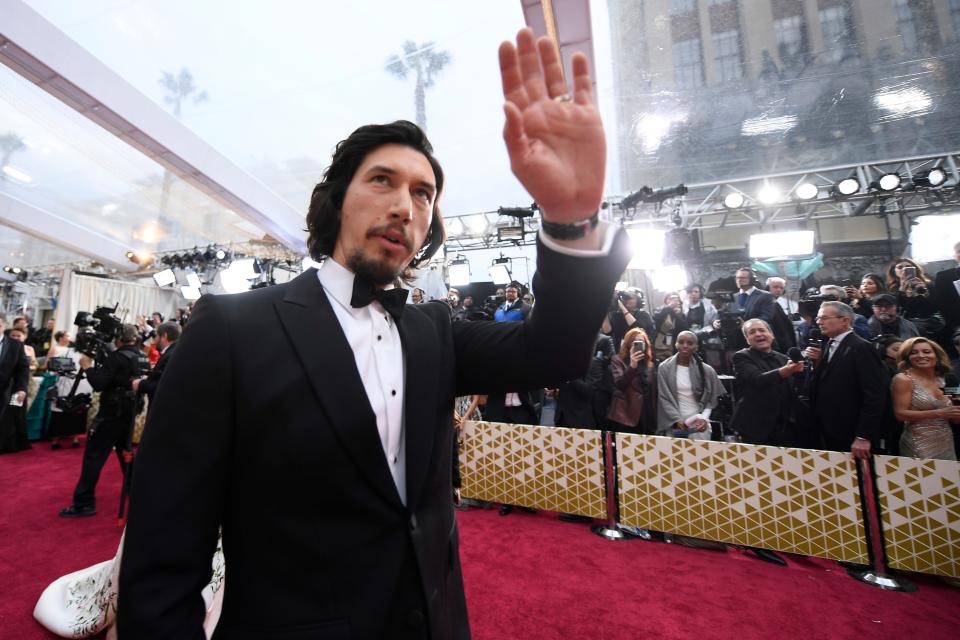John Oliver on the 'stupid' fun of HBO's 'Last Week Tonight': 'Is this something people want?' (Yes)
Sunday marks the eighth-season premiere of HBO's "Last Week Tonight," and host John Oliver is ready for action, with 30 new episodes planned this year.
"Last Week" (Sundays, 11 EST/PST) has won 20 Emmy Awards, including trophies for outstanding variety talk series the last five years in a row. Last season's highlights included taunting the town of Danbury, Connecticut, into renaming a sewage treatment plant in Oliver's "memory"; unearthing a coveted piece of vintage "rat erotica"; and a mock confrontation with actor Adam Driver about Oliver's obsession with the "Star Wars" actor.
Since his last episode aired Nov. 15, in which British-born Oliver, 43, literally blew up 2020, Americans have faced still more crises: a worsening pandemic, unfounded election-fraud claims, an insurrection at the U.S. Capitol and the not-so-peaceful transfer of power to President Joe Biden.
So is he excited to get back on the air? How has former President Donald Trump's exit from the world stage affected his comedy? And why did he pick on Danbury? (Edited and condensed for clarity.)

Question: So did you miss anything while you were off the air? Any regrets about not having the opportunity to address it?
John Oliver: No, there were only things that I was actively grateful that I didn’t have to address. There was absolutely no part of me on Jan. 6, 7, 8, or 9 that made me think, "Aw, I really wish we had a show this week." It was more the sweet sound of a bullet whizzing past my ear.
Q: People might assume otherwise.
Oliver: Yeah, it’s hard to know because your thoughts are constantly shifting as the day goes on. That day started pretty funny: Rudy Giuliani walking on to “Macho Man": That’s funny. Things get less funny when people are dying, that’s the problem. It’s so hard…how on earth do you time stamp a show, thinking ‘I don’t know the joke that we’re writing that works right now, I don’t know if that’s gonna work in 90 minutes’ time.’
Q: Are you going back to the studio or are you still going to be home?
Oliver: We’re gonna be in the white void. When are we gonna be back in the studio? That’s kind of up to the people that are rolling out the (expletive) vaccine. I guess we’re really lucky in that we don’t have to go back. We can keep everyone paid, and we’re probably going to err on the side of extreme caution, partly because it feels like the right thing to do and also partly because a bunch of our staff got sick at the start of the pandemic and so it doesn’t really feel theoretical. I really love this show, but I don’t want it to physically hurt someone.

Q: You probably hadn’t planned to utter Trump’s name again, but now you’re back the week of his second impeachment trial. So how is that going to play out?
Oliver: It’s not great timing. I think we’ll probably try and contain that to as little a time at the top of the show as is possible, unless all hell breaks loose.
Q: It’s hard to believe you’re going into your eighth season. And that Jon Stewart has just now joined Twitter.
Oliver: That is a sign of the apocalypse: Jon Stewart joining Twitter, that’s either very good news or very, very bad. I think a horseman of the apocalypse could’ve been the verified signal being slammed on that Twitter account.
Q: Let’s look back at last season. Was there something that was the biggest surprise: getting a sewage plant in Connecticut named after you? Finding the rat erotica that you thought you might not find?
Oliver: Finding the rat erotica was the first time I was reassured that we were gonna be able to do stupid things as the death count was climbing. Before that, I honestly wasn’t sure: ‘Is this something people want? It’s something I feel elementally I need, but, like, will this work?’ So from that point on everyone was, "Oh no, we can absolutely still do our favorite thing," which is incredibly stupid stuff and actually, all that gave us was the confidence to probably accelerate that.

The sewage plant thing, (what) I found really inspirational about that, is that you always feel nervous if you’re letting someone else take control of a joke, if that makes sense. And occasionally people really surprise you, like Russell Crowe delivering a perfect joke with a koala ward. A Connecticut mayor, or whatever staffer he had, coming up with not just a sewage plant – a memorial sewage plant for someone who’s still alive – is a legitimately good joke. So once they did that, it still felt delicate. It seems like they’re slightly angry with us; is there a way to keep this fun? And to actually get there in Jude Law’s suit from "Contagion," it was the first time I’d shot anything that year. It was really great. To feel like we’re to finally land that joke was a genuinely euphoric feeling.
Q: I’m glad it paid off so successfully.
Oliver: Yeah, and you know everyone worries about their legacy. I don’t need to worry about that anymore: I have a legacy, and it’s a pungent area of Danbury, Connecticut.
Q: What prompted your fixation on Danbury, or Adam Driver? Were these just random bits?
Oliver: Nothing! That’s what’s so great about it. If it felt like you had driven that uphill, it would be less satisfying than a total throwaway comment. That joke, it was just from a writer of ours, Owen Parsons, who was writing a piece about jury selection and just reaching for a town, put absolutely no thought into it at all. Just bang, we picked the joke, we say it – don’t really think that much about it – and all of a sudden you have this dessert trolley of options in front of you.
Similarly, Adam Driver. That is just a joke with an audience. We kind of liked the very mixed reception that it got. Some people think it was funny, some people saying, ‘That seems more odd than funny.’ We did it a second time, definitely did not feel like people were completely on board, then took that joke with us into the void and then we kind of felt like we’d wrapped that up. That’s when, probably about halfway through the year, we reached out to him and just said, ‘Would you do something at the end of the year? If no, it’s fine, we’ll just stop doing it. If yes, we’re gonna do it some more.’ And he said 'Yeah.'

Q: What does this current political climate mean for you in terms of trying to find comedy? Some of what you do is serious and some of it is funny. What does this juncture offer, when we’re mostly done with Trump?
Oliver: As a person, probably. But we’re probably not done with what he’s stirred up.
Q: So how does it inform what kind of material you can work with? For four years, you had somebody to mock and also be exasperated by. What’s fair game now?
Oliver: The frustrating thing with him sometimes was he wanted to make himself the focus of a story so much, and he was good at that. But that could suck a lot of the oxygen out when he is not the most important part of every single story. As president, he’s a pretty important part, but lots of problems, as we know, predated him and will last long after he’s gone. So it’s actually gonna be nice not to have that.
In general, he was terrible for comedy, (but) the one time that he could be useful was if he was trying to explain something really complicated. He was very good at getting something flamboyantly, succinctly wrong. So, like, we did a piece on trade. Trade is really hard to explain because it’s really complicated. And you could almost move through the story with chapter headings with having him explain what he thinks something is. And for him to be so spectacularly, usefully wrong, you could say ‘OK, it’s not that.’ You could kind of throw to him, saying ‘I’ll let him explain what it is so you know what it isn’t.’ And that was actually quite useful. (But) that was the one way in which he was useful, and we can do without it.
The only thing I think might be interesting going forward, in terms of picking up what happened last year with the pandemic is that, if nothing else, the pandemic did shine a light on systemic problems that those who have been able to have been conveniently avoiding thinking about for a long time. And I think that the danger is, as we gradually come out the other side of this pandemic, it’s gonna be very easy for those same people to go back to decide to ignore those issues. And so I think it will be fun and illuminating to try and not let that happen. To go back and say, ‘Hey, that thing that seemed like it was a problem during the pandemic was actually a problem before the pandemic and is still a problem now.’
This article originally appeared on USA TODAY: John Oliver: How Trump's exit, pandemic shape 'Last Week Tonight'
